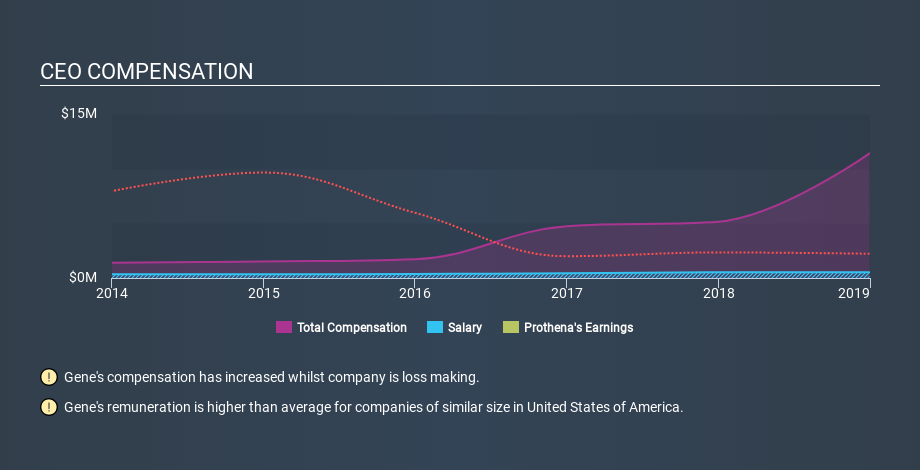- United States
- /
- Biotech
- /
- NasdaqGS:PRTA
Is Prothena Corporation plc's (NASDAQ:PRTA) CEO Paid Enough Relative To Peers?

Gene Kinney has been the CEO of Prothena Corporation plc (NASDAQ:PRTA) since 2016. This analysis aims first to contrast CEO compensation with other companies that have similar market capitalization. Then we'll look at a snap shot of the business growth. Third, we'll reflect on the total return to shareholders over three years, as a second measure of business performance. This process should give us an idea about how appropriately the CEO is paid.
See our latest analysis for Prothena
How Does Gene Kinney's Compensation Compare With Similar Sized Companies?
According to our data, Prothena Corporation plc has a market capitalization of US$425m, and paid its CEO total annual compensation worth US$11m over the year to December 2018. We think total compensation is more important but we note that the CEO salary is lower, at US$525k. We note that more than half of the total compensation is not the salary; and performance requirements may apply to this non-salary portion. We examined companies with market caps from US$200m to US$800m, and discovered that the median CEO total compensation of that group was US$1.8m.
It would therefore appear that Prothena Corporation plc pays Gene Kinney more than the median CEO remuneration at companies of a similar size, in the same market. However, this fact alone doesn't mean the remuneration is too high. A closer look at the performance of the underlying business will give us a better idea about whether the pay is particularly generous.
You can see, below, how CEO compensation at Prothena has changed over time.

Is Prothena Corporation plc Growing?
Over the last three years Prothena Corporation plc has grown its earnings per share (EPS) by an average of 24% per year (using a line of best fit). In the last year, its revenue is down 15%.
This shows that the company has improved itself over the last few years. Good news for shareholders. Revenue growth is a real positive for growth, but ultimately profits are more important. You might want to check this free visual report on analyst forecasts for future earnings.
Has Prothena Corporation plc Been A Good Investment?
With a three year total loss of 81%, Prothena Corporation plc would certainly have some dissatisfied shareholders. So shareholders would probably think the company shouldn't be too generous with CEO compensation.
In Summary...
We compared total CEO remuneration at Prothena Corporation plc with the amount paid at companies with a similar market capitalization. We found that it pays well over the median amount paid in the benchmark group.
However, the earnings per share growth over three years is certainly impressive. However, the returns to investors are far less impressive, over the same period. While EPS is positive, we'd say shareholders would want better returns before the CEO is paid much more. CEO compensation is one thing, but it is also interesting to check if the CEO is buying or selling Prothena (free visualization of insider trades).
Important note: Prothena may not be the best stock to buy. You might find something better in this list of interesting companies with high ROE and low debt.
If you spot an error that warrants correction, please contact the editor at editorial-team@simplywallst.com. This article by Simply Wall St is general in nature. It does not constitute a recommendation to buy or sell any stock, and does not take account of your objectives, or your financial situation. Simply Wall St has no position in the stocks mentioned.
We aim to bring you long-term focused research analysis driven by fundamental data. Note that our analysis may not factor in the latest price-sensitive company announcements or qualitative material. Thank you for reading.
About NasdaqGS:PRTA
Prothena
A late-stage clinical biotechnology company, focuses on discovery and development of novel therapies to treat diseases caused by protein dysregulation in the United States.
Flawless balance sheet and undervalued.
Market Insights
Community Narratives



